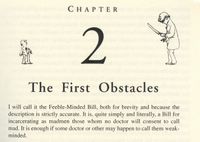Some trends I noted,
The contention that ‘relative class differences in early mortality rates do not reflect class differences in environment' has re-emerged, as also has the investigation of the social class distribution of gene pools.’ The revitalized debate about the heritability of IQ is well-known (see Rose’ Rose et al.’ the invention of sociobiology also returns the discussion of the dominance of biological factors to an earlier mode.’ Within the natural sciences a new genetics is being bred, which, like its parents, limits the trail of individual differences to their supposed source in the gene — in the time of the founder of eugenics, Francis Galton, an abstract concept, but now one with a definable chemical meaning. Recent scientific work in the domain of reproduction holds up a new vision of the scientific control of the quality of life which would have warmed the hearts of the early eugenists, and, like their earlier visions, unceremoniously disregards the ethical concerns of ordinary people, including women as the major recipients of repro ductive techniques (see Corea)
At the same time as these developments have occurred, the intellectual and practical activity of sociological research on health is being cut back. The medicine of the social, evolved into a sociology of the medical (and importantly also of health) is the victim of several related trends, including the ideological and financial investment in ‘pure’ science....
(Eugenics, Social Medicine and the
Career of Richard Titmuss in Britain 1935-50
By Ann Oakley
The British Journal of Sociology
Vol. 42, No. 2 (Jun., 1991), pp. 189)

I agree with Chesteron's summaries of those who subtley come to venerate science and so to believe in the scientism of their day, from phrenology to the modern mythological narratives of Naturalism. His first summary is a description of the average science thumper and it is apt:
Most Eugenists are Euphemists. I mean merely that short words startle them, while long words soothe them. And they are utterly incapable of translating the one into the other, however obviously they mean the same thing. Say to them “The persuasive and even coercive powers of the citizen should enable him to make sure that the burden of longevity in the previous generation does not become disproportionate and intolerable, especially to the females”; say this to them and they will sway slightly to and fro like babies sent to sleep in cradles. Say to them “Murder your mother,” and they sit up quite suddenly. Yet the two sentences, in cold logic, are exactly the same.(Eugenics and Other Evils: An Argument
....I will refer to two actual cases from the Eugenic discussions. When Sir Oliver Lodge spoke of the methods “of the studfarm” many Eugenists exclaimed against the crudity of the suggestion. Yet long before that one of the ablest champions in the other interest had written “What nonsense this education is! Who could educate a racehorse or a greyhound?” Which most certainly either means nothing, or the human studfarm. Or again, when I spoke of people “being married forcibly by the police,” another distinguished Eugenist almost achieved high spirits in his hearty assurance that no such thing had ever come into their heads, Yet a few days after I saw a Eugenist Pronouncement, to the effect that the State ought extend its Powers in this area. The State can only be that corporation which men permit to employ compulsion; and this area can only be the area of sexual selection. I mean somewhat more than an idle jest when I say that the policeman will generally be found in that area. But I willingly admit that the policeman who looks after weddings will be like the policeman who looks after wedding-presents. He will be in plain clothes. I do not mean that a man in blue with a helmet will drag the bride and bridegroom to the altar. I do mean that nobody that man in blue is told to arrest will even dare to come near the church.
Against the Scientifically Organized Society
By G.K. Chesterton
(With Additional Articles by his
Eugenic and Birth Control Opponents
Edited by Michael W. Perry :19-20)

(Quote by a Eugenicist)
No comments:
Post a Comment